Blinken's China trip exceeded expectations
Zaobao correspondent Yang Danxu notes that US Secretary of State Antony Blinken's China visit achieved intangible but important small steps in steering the US-China relationship out of high-escalation waters and bringing it back to the improved situation after US President Joe Biden and Chinese President's Xi Jinping's meeting in Bali last year.
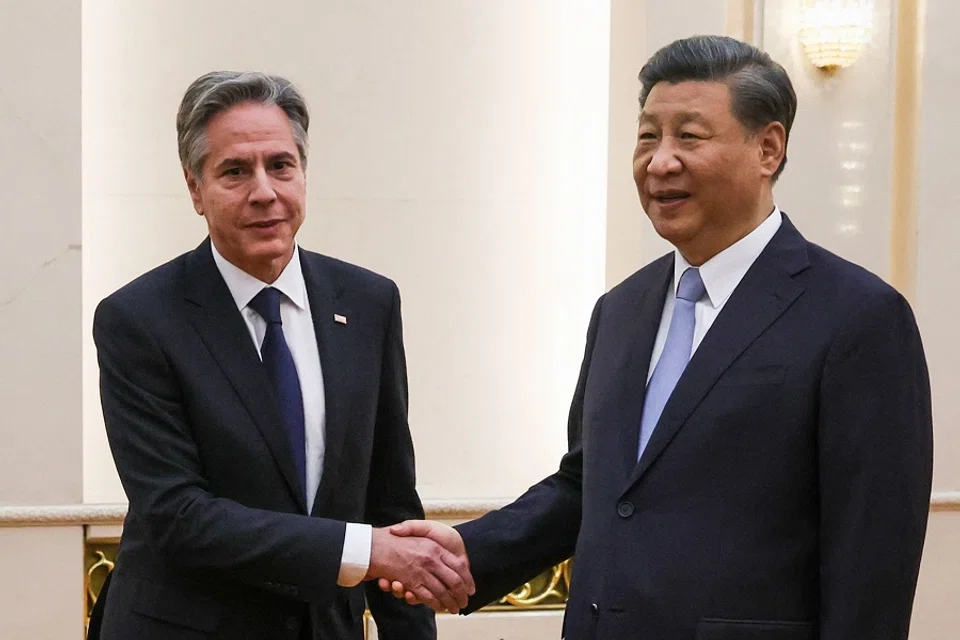
US Secretary of State Antony Blinken wrapped up his two-day visit to China on 19 June.
Perhaps because China-US relations are poor, observers did not have high hopes for this battle-ridden trip; both China and the US told the world not to expect too much. But following the two-day programme which included three meetings, people are now saying that Blinken's China trip ended on a high, exceeding expectations.
The Chinese and American leaders seem satisfied as well. After Blinken's visit, US President Joe Biden, who was in California at the time, praised his state secretary for doing "a hell of a job", and said that they were now "on the right trail".
Some points of consensus reached
During the final and most important meeting with Chinese President Xi Jinping at the tail-end of the Blinken's trip, Xi told Blinken and others in his delegation that it was "very good" that both sides reiterated their commitment to working together to implement the consensus Xi and US President Biden had reached in Bali, and that progress was made and agreement reached on some specific issues.
But barring any incidents like former US House Speaker Nancy Pelosi's visit to Taiwan or the balloon incident in the next five months, a meeting between Xi and Biden can still be expected.
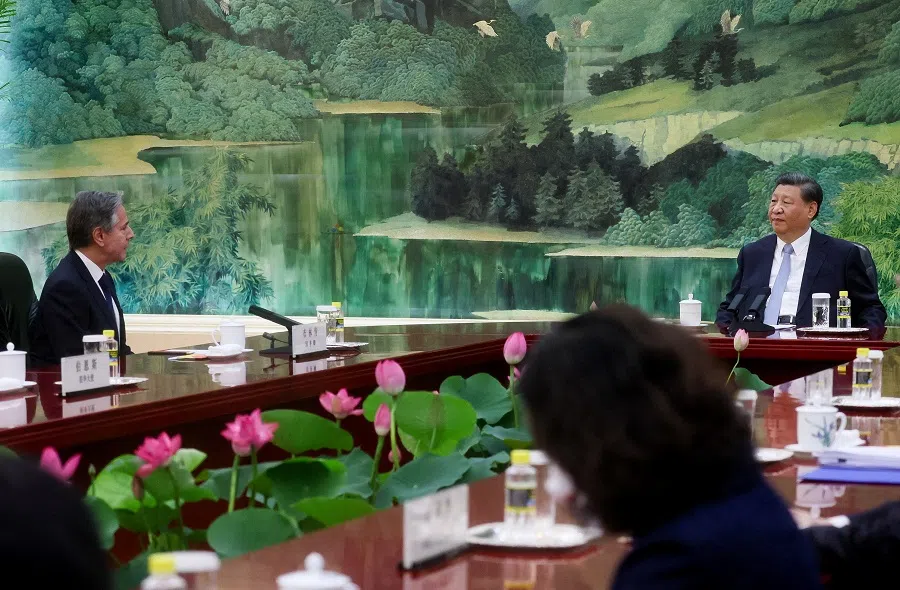
Based on the press release issued by China and the US, both sides have indeed agreed on some matters, including agreeing to continue discussions on developing principles to guide the bilateral China-US relationship; encouraging further progress through the joint Working Groups; strengthening people-to-people exchanges between students, scholars, and business; and working to increase the number of direct flights between the two countries, among other things.
Another important consensus reached at the meeting is that both sides have agreed to maintain high-level interactions - Blinken invited State Councilor and Foreign Minister Qin Gang to visit the US, and Qin has also agreed to make the visit at a mutually convenient time. In the next stage, US Secretary of the Treasury Janet Yellen, Secretary of Commerce Gina Raimondo and special presidential envoy for climate John Kerry are also expected to visit China.
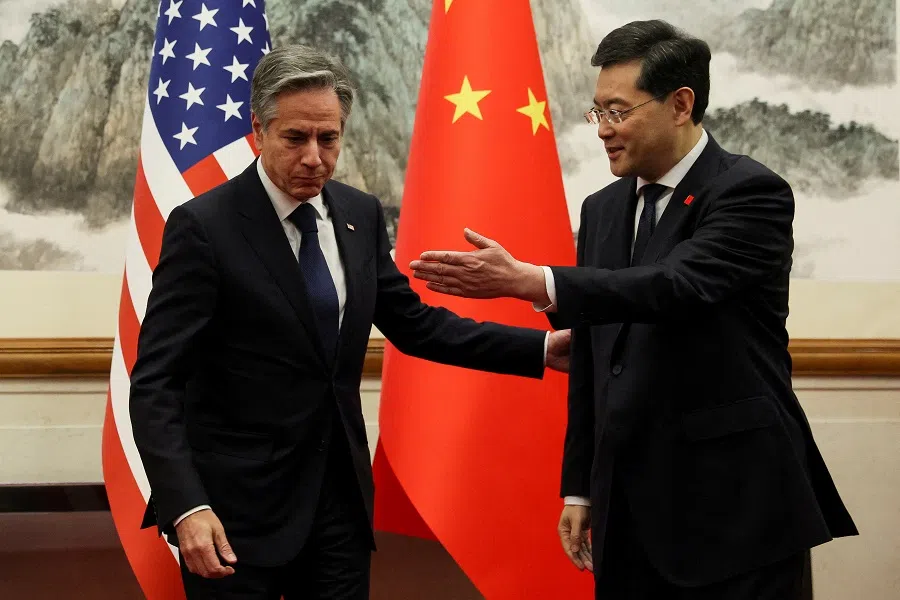
Both China and the US are tight-lipped on whether their presidents will meet at the Asia-Pacific Economic Cooperation (APEC) summit at the end of the year. But barring any incidents like former US House Speaker Nancy Pelosi's visit to Taiwan or the balloon incident in the next five months, a meeting between Xi and Biden can still be expected.
By reiterating the "five Nos" at this juncture, Blinken is attempting to "rewind" China-US relations to the state they were in after the Bali summit.
Individual goals achieved
China and the US each achieved their goals during Blinken's China visit.
For Beijing, Blinken reaffirmed Washington's commitment to the "five Nos" (that the US does not seek a new Cold War, it does not seek to change China's system, its alliances are not directed at China, it does not support "Taiwan independence", and it does not seek conflict with China).
These are the basic ground rules that Biden has proposed, since taking office, to prevent bilateral relations from spiralling out of control. Biden had also reiterated the "five Nos" during his earlier phone call with Xi and their meeting in Bali last year.
By reiterating the "five Nos" at this juncture, Blinken is attempting to "rewind" China-US relations to the state they were in after the Bali summit. As Beijing considers the "five Nos" the foundation for developing China-US relations, it is believed to be the commitment that China most wants to hear.
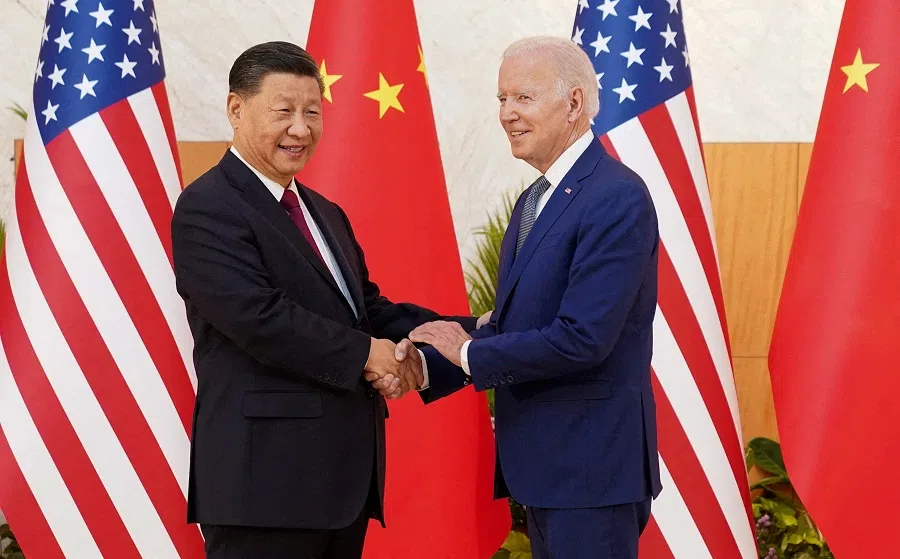
For the US, Blinken's visit allowed Washington to rebuild its communication channels with Beijing, enabling the US to express its concerns directly to China and engage in cooperation that aligns with US interests. Also, for those concerned about a potential escalation of conflict between the two countries, Washington demonstrated a responsible attitude in managing US-China relations.
... the greatest achievement of Blinken's visit is the consensus reached between the two sides to stabilise bilateral relations and avoid slipping into conflict, easing the months-long tension between China and the US.
However, whether for Beijing, Washington, or those closely monitoring US-China relations, the greatest achievement of Blinken's visit is the consensus reached between the two sides to stabilise bilateral relations and avoid slipping into conflict, easing the months-long tension between China and the US.
Deescalating tensions
Political academics had earlier repeatedly warned against the risk of sleepwalking into a crisis, and bilateral relations between China and the US after the balloon incident did indeed make many people break into a cold sweat. High-level contacts between the two countries were all but halted, military communications were cut off, and confrontations between military aircraft and ships occurred in the South China Sea and the Taiwan Strait in late May and early June.

While no one wants a military conflict to break out, if anything was sparked off, the consequences would be unimaginable, and both China and the US have limited room for concessions due to domestic and international pressure. It is precisely for this reason that the two countries can clearly define the bottom line - competition is one thing, but confrontation must not escalate into clashes, much less war. This has been reassuring to the international community.
However, Blinken's visit did not result in any breakthroughs in the controversial issues that have caused tensions between China and the US, including US support for Taiwan, restrictions on the export of key technologies to China, mutual sanctions on each other's companies, and so on; there was also no progress in establishing military communication channels. Blinken is well aware of this, and he candidly said during the press conference before leaving Beijing that "none of this gets resolved with one visit, one trip, one conversation."
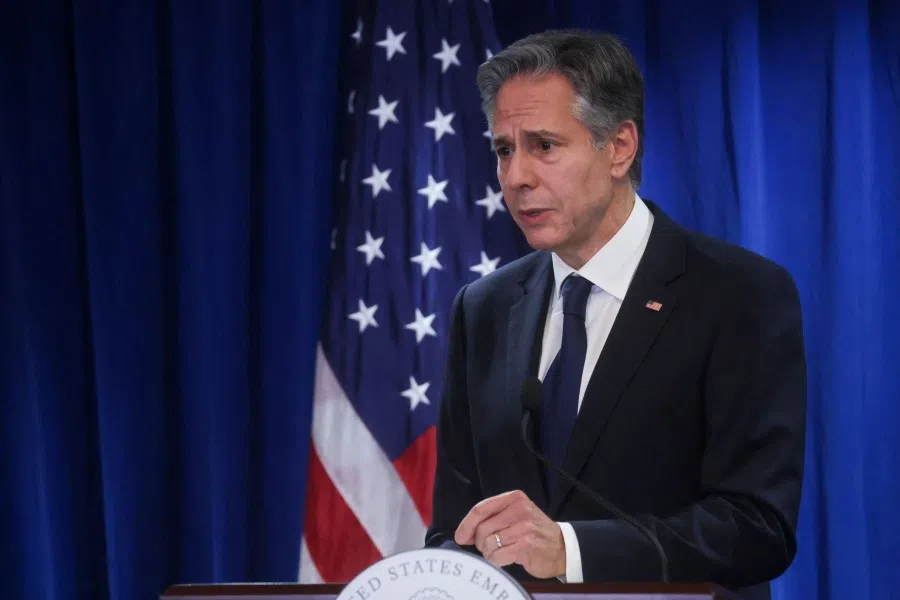
Many differences between China and the US are structural, and they will continue to clash as both sides seek to safeguard and pursue their national interests. The US will continue to contain China in various ways, especially in the military and high-tech fields, to maintain its global hegemony, while China will continue to develop its military and economic strength and continue to counter US pressure.
And when it comes to the most sensitive issue of Taiwan, the differences between both sides are also irreconcilable. Washington has reiterated the "one China" policy, but will not allow Beijing to subject Taiwan to armed reunification, losing its means to contain China in the western Pacific; Beijing cannot turn a blind eye to the US's "salami slicing" approach on the Taiwan issue, nor will it abandon its plan for national reunification. Both sides also have domestic politics and nationalism influencing foreign policies, which means inevitable instability in bilateral relations.
Mutual suppression and countermeasures between China and the US have become the norm, and will not change because of interactions and promises between high-level officials. However, opening a crack in the door for dialogue and preventing confrontation from escalating into a clash is already the best thing coming out of Blinken's visit.
This article was first published in Lianhe Zaobao as "超预期的布林肯中国行".
Related: Blinken's trip to China is not a wasted one | The balloon is down: Whither US-China relations now? | US Secretary of State Blinken's visit to China is paved with thorns | China's 'hegemony with Chinese characteristics' in the South China Sea | Is Biden's promise of a US-China thaw believable?


![[Big read] When the Arctic opens, what happens to Singapore?](https://cassette.sphdigital.com.sg/image/thinkchina/da65edebca34645c711c55e83e9877109b3c53847ebb1305573974651df1d13a)


![[Video] George Yeo: America’s deep pain — and why China won’t colonise](https://cassette.sphdigital.com.sg/image/thinkchina/15083e45d96c12390bdea6af2daf19fd9fcd875aa44a0f92796f34e3dad561cc)